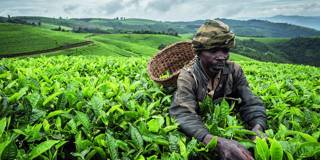After the devastating blow that COVID-19 dealt to low- and middle-income countries, the economic fallout from Russia's war in Ukraine has compounded the damage by driving up the prices of key commodities. Building more resilience and sustainability into the world's food systems has never been more urgent.
NAIROBI – In recent years, successive shocks have undermined global food security, reversing decades of progress. COVID-19, for example, pushed 70-100 million people into extreme poverty and 118 million more into food insecurity (defined as a “lack of regular access to enough safe and nutritious food for normal growth and development and an active and healthy life”). In East Africa, the worst locust swarms in 70 years deepened food insecurity in a region that was already struggling with significant drought. And now, Russia’s war in Ukraine has further exposed fragilities in the world’s food systems.
At a time when food prices were already rising, the conflict has curtailed supplies of wheat, vegetable oil, and fertilizer from throughout the Black Sea region. Each of these commodities bears directly on global food security and nutrition outcomes. The Center for Global Development estimates that higher food and fuel prices will push 40 million more people into extreme poverty and hunger, mainly in Africa. Hundreds of millions more will suffer hardship.
These shocks have sent a clear message: We must fundamentally transform our food systems to make them more resilient. Worsening global conditions have also amplified many of the challenges discussed at the UN Food Systems Summit that Secretary-General António Guterres hosted last fall. As we noted then, the world is far behind in achieving the UN Sustainable Development Goals (SDGs). Our food systems, which should be a source of solutions, are a big part of the problem.

NAIROBI – In recent years, successive shocks have undermined global food security, reversing decades of progress. COVID-19, for example, pushed 70-100 million people into extreme poverty and 118 million more into food insecurity (defined as a “lack of regular access to enough safe and nutritious food for normal growth and development and an active and healthy life”). In East Africa, the worst locust swarms in 70 years deepened food insecurity in a region that was already struggling with significant drought. And now, Russia’s war in Ukraine has further exposed fragilities in the world’s food systems.
At a time when food prices were already rising, the conflict has curtailed supplies of wheat, vegetable oil, and fertilizer from throughout the Black Sea region. Each of these commodities bears directly on global food security and nutrition outcomes. The Center for Global Development estimates that higher food and fuel prices will push 40 million more people into extreme poverty and hunger, mainly in Africa. Hundreds of millions more will suffer hardship.
These shocks have sent a clear message: We must fundamentally transform our food systems to make them more resilient. Worsening global conditions have also amplified many of the challenges discussed at the UN Food Systems Summit that Secretary-General António Guterres hosted last fall. As we noted then, the world is far behind in achieving the UN Sustainable Development Goals (SDGs). Our food systems, which should be a source of solutions, are a big part of the problem.